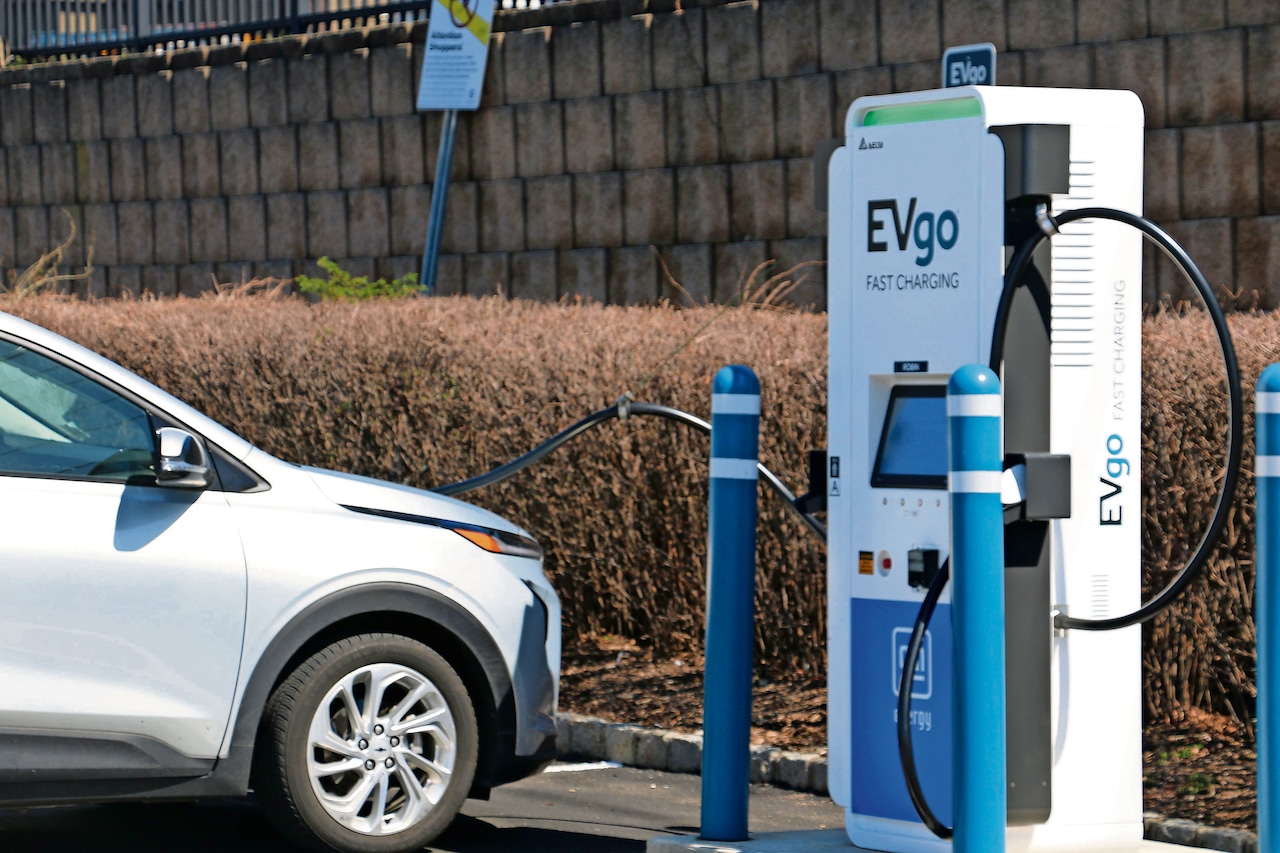The Auto Industry's Standoff: Dealers Vs. Electric Vehicle Mandates

Table of Contents
Dealer Resistance to Electric Vehicle Mandates
Dealerships are facing significant challenges adapting to the rapid shift towards EVs, leading to considerable resistance against electric vehicle mandates. This resistance stems from several key factors:
Investment Costs and Infrastructure
Adapting to EV sales requires substantial investments for dealerships. This includes:
- Upgrading service facilities: Handling high-voltage batteries and specialized EV repair necessitates significant upgrades to existing infrastructure, including specialized tools and safety equipment. The cost of training technicians on these systems is also considerable.
- Installing charging infrastructure: Dealerships need to install charging stations, potentially requiring significant electrical grid upgrades to handle the increased power demand. This is a costly upfront investment with ongoing maintenance expenses.
- Reduced service revenue: EVs have fewer moving parts than internal combustion engine (ICE) vehicles, resulting in less frequent and less extensive service needs. This translates to potentially lower service revenue for dealerships, impacting their overall profitability.
Sales Model Disruption
The transition to EVs is disrupting long-established sales processes, further fueling dealer resistance to electric vehicle mandates. This disruption manifests in several ways:
- Direct-to-consumer sales: Some manufacturers are bypassing dealerships entirely with direct-to-consumer (DTC) sales models, cutting out the traditional dealer intermediary and threatening their viability.
- Online sales: The increasing shift to online sales platforms reduces the importance of physical showrooms, impacting dealerships heavily reliant on in-person sales.
- Inventory management complexities: Managing EV inventory presents unique challenges compared to ICE vehicles, including longer lead times, fluctuating battery technology, and the need for specialized storage and handling.
Lack of EV Inventory and Consumer Demand Uncertainties
Dealers are hesitant to invest heavily in EV infrastructure when consumer demand remains uncertain in certain markets. Several factors contribute to this uncertainty:
- Limited EV model availability: The limited availability of certain EV models, particularly those with longer ranges and advanced features, can affect profitability and customer satisfaction.
- Uncertain resale value: Dealers are concerned about the long-term resale value of EVs, particularly given the rapid pace of technological advancements in battery technology and charging infrastructure. This uncertainty impacts their ability to accurately assess the financial risks associated with EV investments.
- Consumer apprehension: Some consumers remain hesitant to adopt EVs due to range anxiety, charging infrastructure limitations, and concerns about battery lifespan. This uncertainty makes it difficult for dealers to predict future demand.
Manufacturer Challenges in Meeting Electric Vehicle Mandates
Automakers also face significant hurdles in meeting the ambitious targets set by electric vehicle mandates. These challenges go beyond simply producing EVs:
Production Capacity and Supply Chain Issues
Scaling up EV production to meet mandated targets presents immense logistical challenges:
- Battery supply chain: Securing sufficient supplies of batteries and raw materials (like lithium and cobalt) is a major bottleneck, as is securing reliable supply chains to support the expansion.
- Semiconductor shortages: Ongoing semiconductor shortages continue to hamper production across the automotive industry, impacting both EV and ICE vehicle production.
- Investment in new facilities: Building new manufacturing plants and upgrading existing ones to produce EVs requires massive capital investment.
Consumer Adoption and Range Anxiety
Widespread consumer adoption is essential for the success of EV mandates, but several hurdles remain:
- Range anxiety: Concerns about limited driving range and the availability of charging stations continue to deter potential EV buyers.
- Charging infrastructure: The lack of widespread and reliable public charging infrastructure, especially in rural areas, is a significant barrier to EV adoption.
- Public perception: Educating consumers about the benefits of EVs and addressing misconceptions about their performance, safety, and environmental impact is crucial.
Balancing EV Transition with ICE Vehicle Production
Automakers face the complex task of transitioning to EVs while still meeting demand for ICE vehicles:
- Dual investments: Investing in both EV and ICE technologies places a significant financial burden on manufacturers.
- Production line balancing: Maintaining a balanced production line that can efficiently produce both EV and ICE vehicles while adapting to evolving regulations is a complex logistical challenge.
- Workforce retraining: Retraining the workforce to handle new technologies and manufacturing processes is crucial for a smooth transition.
Potential Solutions and Compromises
Addressing the concerns of both dealers and manufacturers requires a multifaceted approach:
Government Incentives and Support
Government intervention is crucial to facilitate the transition:
- Financial incentives: Tax credits and rebates for EV purchases can stimulate consumer demand.
- Charging infrastructure investment: Public funding for the development of charging infrastructure is essential to address range anxiety.
- Dealer support programs: Financial assistance and training programs can help dealerships upgrade their facilities and train their technicians.
Collaboration and Dialogue
Open communication and collaboration are key:
- Clear guidelines: Establishing clear and consistent regulations regarding EV mandates will provide certainty for both manufacturers and dealers.
- Flexible mandates: Allowing for flexibility and phased approaches can help manage the transition more effectively.
- Industry-government partnerships: Fostering collaboration between government agencies, automakers, and dealerships will promote consensus and informed decision-making.
Innovative Business Models
Exploring new business models can help alleviate the tensions:
- Hybrid sales models: Combining online and in-person sales can benefit both manufacturers and dealerships.
- Revenue-sharing models: Implementing revenue-sharing models can incentivize dealer participation in EV sales.
- New service revenue streams: Developing new service and maintenance revenue streams specific to EVs can help compensate for reduced service revenue from traditional vehicles.
Conclusion
The standoff between dealers and electric vehicle mandates highlights the complexities of transitioning to a cleaner transportation future. While the need for reducing carbon emissions is undeniable, addressing the concerns of dealerships and manufacturers is critical to ensure a successful and sustainable transformation. Finding solutions through government support, open collaboration, and innovative business models is vital. The future of the automotive industry depends on navigating this challenge effectively, ensuring the smooth implementation of electric vehicle mandates without disrupting the entire dealer network. Understanding the intricacies of this electric vehicle mandates debate is key to shaping a responsible and efficient future for the automotive industry. Let's work together to find solutions that benefit everyone involved in this critical transition.

Featured Posts
-
 Petition To Replace Lady Liberty With Jalen Brunson Gains Traction
May 16, 2025
Petition To Replace Lady Liberty With Jalen Brunson Gains Traction
May 16, 2025 -
 Eau Du Robinet Polluee Solutions De Filtration Pour Une Eau Potable Saine
May 16, 2025
Eau Du Robinet Polluee Solutions De Filtration Pour Une Eau Potable Saine
May 16, 2025 -
 Tom Cruise And Ana De Armas Spotted Together Again In England Dating Speculation Intensifies
May 16, 2025
Tom Cruise And Ana De Armas Spotted Together Again In England Dating Speculation Intensifies
May 16, 2025 -
 The Fallout From Microsofts 6 000 Layoffs
May 16, 2025
The Fallout From Microsofts 6 000 Layoffs
May 16, 2025 -
 Paddy Pimbletts Ufc 314 Travel The Impact Of Liverpool Fcs Schedule
May 16, 2025
Paddy Pimbletts Ufc 314 Travel The Impact Of Liverpool Fcs Schedule
May 16, 2025
